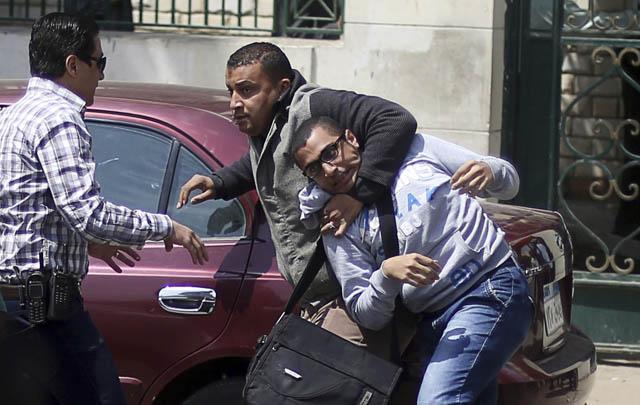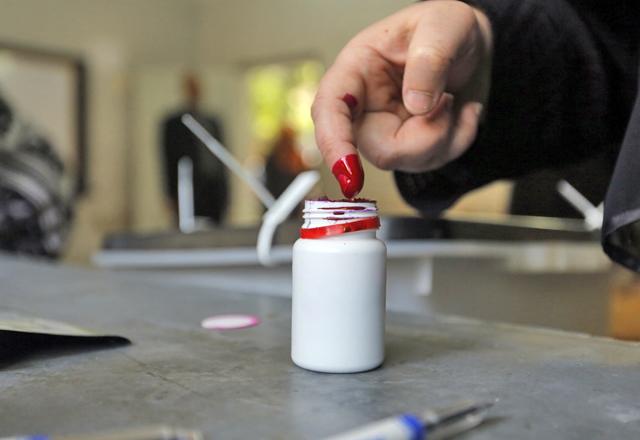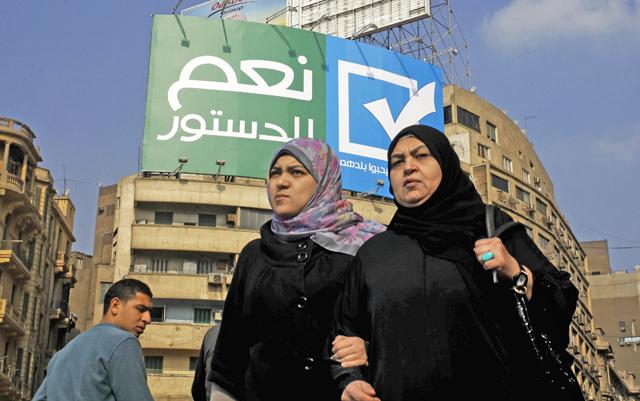You are here
Egypt’s Tahrir Square dream fades as Sisi builds power
By Reuters - Apr 12,2014 - Last updated at Apr 12,2014

CAIRO — In a courthouse near Cairo, a peremptory message hangs above the judge presiding over one of a series of trials involving Egypt's briefly powerful and now almost impotent Muslim Brotherhood.
"In the name of God the Merciful", it reads, "Allah commands you to render trust to whom it is due, and when you judge between people to judge with justice".
The chaotic scenes in the court do not appear to measure up.
A metal cage held 33 members of the Brotherhood — outlawed as a terrorist organisation after the army last July deposed Mohamed Morsi, the elected president who ruled in the Brotherhood's name for one tumultuous year.
Among them was Mohamed Badie, supreme guide of the Brotherhood. It is the most influential mainstream Islamist organisation in the world and its confrontation with the army-backed authorities in Cairo has created a country more divided than at any time since the group was founded in Egypt in 1928.
Dressed in white robes and facing a string of charges, some of which carry the death penalty, the Brothers kept up a barrage of chants, from Allahu Akbar (God is Greatest) to "Down, down with military rule".
The judge, heavily moustached and wearing black sunglasses, looked bored as he scornfully dismissed pleas from lawyers asking for more respectful treatment of their clients.
The judge brusquely ordered defendants and lawyers to be shut up. Scuffles broke out. A phalanx of policemen separated the caged Brothers from lawyers and journalists.
Badie then rose to proclaim that "the people will not accept an army tyrant", referring to Abdel Fattah Al Sisi, the general who carried out last July's coup after mass protests against the divisive Morsi and who recently resigned from the military to contest a presidential election on May 26-27.
Before the curtain came down on this judicial mayhem, the Brotherhood's spiritual leader forecast the inevitable demise of Sisi, despite forecasts that he will win next month's election.
Reminiscent of Mubarak era
It was thought scenes like this had been brought to an end when president Hosni Mubarak was toppled in the 2011 Tahrir Square revolt. But now history seems to be repeating itself, with the army bent on eradicating the Islamists militarily.
Mubarak’s army-backed dictatorship, the continuation of a police state established by Gamal Abdel Nasser with the ousting of the monarchy in 1952, had faced down an Islamist insurgency that targeted him, his ministers and tourists in the 1990s.
In 30 years of Mubarak rule, military tribunals with scant respect for civil law sentenced 90 Islamists to death, of whom 68 were executed. In nine months of Sisi’s army-led government, courts have condemned 529 Islamists to death.
Nor was Egypt so polarised then as it is now. Over 1,000 Morsi supporters were shot dead after last July’s coup, and some 16,000 Brothers, and leaders of the secular youth movement that sparked the Tahrir revolt, have been rounded up and jailed.
Officials privately agree that Egypt needs not just the iron fist but a whole new outlook from its rulers, including an overhaul of the nation’s religious and political institutions.
The pent-up anger among the Tahrir Square youth, close watchers say, is likely to explode again if Sisi or his future government fail to create jobs in the Arab world’s most populous country of 85 million people.
“This country is known to turn on a sixpence very quickly. Sisi is now a total hero; he can be tomorrow’s villain. He knows that,” said a European diplomat. “I wouldn’t want to be in his shoes.”
Sisi’s security establishment has already destroyed nearly all opposition, Islamist and secular. Besides the 529 Islamists sentenced to death, almost 1,000 more have been brought before the courts.
Defence lawyers say Egypt’s judiciary is handing down politically motivated sentences to wipe out the Brotherhood, which won a series of elections after the fall of Mubarak.
Distant dream?
The crackdown, the most brutal in Egypt’s modern history, is fuelling a violent Islamist insurgency across the country.
Since the coup, insurgent attacks have spread from the ungoverned badlands of the Sinai Peninsula into the cities, with a rash of attacks on police, security targets and judges.
Alaa Abdel Fattah, a secular young software engineer and blogger at the heart of the 2011 Tahrir rebellion who is now being prosecuted for demonstrating against the new post-coup order, says Egypt is a dark place now.
“The country is more militarised now than under Mubarak [and] the scale of violence, repression, corruption and direct military control is unprecedented,” Fattah says. “We are already in a much worse position than during Mubarak’s time.”
“The hope that existed after the downfall of Mubarak has become a distant memory,” he said.
Warning that Sisi has to resolve huge problems that will not evaporate, he says “there is despair among a young generation; they are offering nothing. There is no future, no jobs for graduates and no way out”.
For now, Sisi enjoys the adulation of the majority of Egyptians, who see him as a saviour following three decades of Mubarak and three turbulent years since his demise. They appear to believe he is the man to improve their lot.
“People on the street tell me: Don’t talk to me about democracy, talk to me about bread and butter,” said Khaled Dawoud, an activist and spokesman for the liberal Dostour Party.
The economic pressures in Egypt, where millions endure poverty and unemployment, remain the most serious threat to its stability.
Growing insurgency
Sisi, politicians say, is aware of how dangerous the situation is but depends on his generals and army intelligence for information about the state of the country.
A youth boycott this year of a referendum on a new constitution drawn up by a panel named by the military-backed interim government sent shockwaves through the establishment.
There are fears that Sisi’s rise to power will provoke more Islamist protests and tempt him to use force to silence all dissent.
“When Sisi becomes president the Brotherhood won’t stop protesting, we won’t see any let-up in the crackdown, and as long as you have instability we won’t have economic recovery,” said Dawoud.
Former Deputy Prime Minister Ziad Bahaeddine, a moderate in the army-backed government, said Egypt’s future depends on rebuilding national consensus on issues such as a budget deficit estimated at 11 per cent of GDP, fuel subsidies that eat up one quarter of the budget, and addressing acute poverty while maintaining growth.
“Egypt totally collapsed. If you don’t have a national approach you cannot do anything,” he said.
Sisi has defended his crackdown, saying he has to eradicate terrorism, protect national interests and the economy, including the country’s industrial base, which has been hit by instability.
Egypt’s battle with the fundamentalists dates back 60 years. Presidents Nasser and Anwar Sadat tried to crush them but each time the crackdowns failed to eradicate political Islam.
The confrontation with the Brotherhood is particularly hard because of their wider popular base. The movement is embedded in society and spread across Egypt’s villages and towns.
Stuck in a time warp
The Egyptian authorities accuse them of fomenting a jihadi insurgency which appears to be gathering force since the coup, accusations the Brotherhood dismisses.
Ahead of next month’s polls, those who have worked with Sisi say he did not oust Morsi to advance his own presidential ambitions, but has found himself almost obliged to step forward at a critical juncture of Egypt’s history.
They describe him as pragmatic and driven by what he sees as the national interest of Egypt. He regards the army as the only reliable institution able to protect Egypt, take it through a divisive period and prevent a breakdown of the whole system.
That is why, they argue, he has taken control of billions of dollars in aid from the Gulf rushed to Egypt after the coup, and intends to supervise what Cairo hopes will be a further wave of investment from Saudi Arabia and the United Arab Emirates.
“I don’t believe Sisi had a plan from the outset to push them out of power and take over. It was a progression of events — there was a political crisis and millions went to the streets — in which the army felt it had no choice,” the European diplomat said.
Looking forward, there is a consensus among diplomats extending even to some officials, that the military solution will not solve the problem and is making a bad situation worse.
But the Brotherhood is determined to present itself as a victim stripped of legitimate power rather than a movement that can learn from its mistakes and negotiate a return to mainstream politics.
“The Muslim Brotherhood is stubborn and fossilised. It needs to change and move on to a new policy. It is still where it was before July. It is stuck in a bunker,” the European diplomat said.
Yet many Egyptians have no faith in the army either.
“We tried the military for 60 years and where did we get to? We got corruption, no proper healthcare or education, no real political power or parties. This was the achievement of Mubarak so why do you want to repeat that again?” said Dawoud.
Related Articles
An Egyptian court sentenced 119 supporters of the Muslim Brotherhood of former president Mohamed Morsi to three years each in prison on Wednesday in connection with protests last October against his overthrow, judicial sources said.
Egyptians voted on Tuesday for the first time since the military deposed president Mohamed Morsi on a draft constitution that may set the stage for a presidential bid by army chief General Abdel Fattah Al Sisi.
Egyptians vote this week for the first time since Mohamed Morsi’s downfall in a constitutional referendum that will likely give a final push to a presidential bid by the man who deposed him, army chief General Abdel Fattah Al Sisi.
















